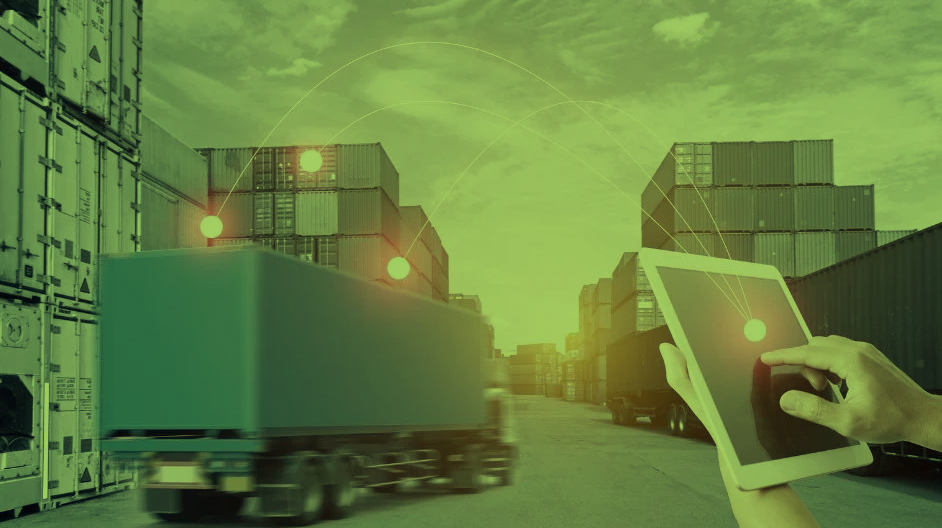We hear about connected tech and telemetry in truck transport, but let’s not forget the trailers. Today’s trailers are hardwired with sensors to help deliver goods safely, on time, and intact.
By Ben Polk
Fleet managers have a lot on their plates these days. Capacity is strained, the supply chain is shaky, and you have an all-out commitment to get assets on the road and deliver them on time, every time. So how can trailer technology help keep drivers safe, their assets sound, and their cargo unharmed?
One piece of trailer tech does all of that and more: trailer sensors.
Sensors can prevent spoilage, pilferage, breakdowns, and equipment failures. They can aid trackability and traceability, and show you the facts about your shipments. They can also tell you which trailers are fully en route, which are available, and where they all are in an otherwise congested and complex supply chain landscape. They’ll let you know when your tires may have a leak or your liftgate battery charge is woefully low. Sensors tell you the temperature inside the trailer, the humidity, and just about everything else you need to know.
All of that just scratches the surface. In this article, we’re discussing how trailer sensor technology works and why it’s some of the most critical trailer tech out there, including the following topics:
In this article:
- How Do Sensors Work?
- Tire Pressure Monitoring Systems
- Battery Charge Indicators
- Cargo Sensors
- Refrigeration Monitoring
- The Dawn of Sensors as an Integral Part of Trailer Technology
How Does Sensor Technology Work?
Sensors work by detecting something physical and sending signals about those properties digitally to a local or remote platform. You can use that data to monitor everything from tire pressure to battery charge and even the presence of cargo within your trailers.
Sensors have many applications and different levels of complexity. Perhaps most commonly, you can use sensors on truck trailers to monitor conditions, ensure proper operation, and make sure that cargo is safely delivered without degradation or damage.
Types of Trailer Sensors
Sensors on trailers fall into two categories: trailer equipment monitoring and cargo monitoring. Here’s how each type of trailer tech works.
1. Trailer Equipment Sensors
There are a few different types of sensors designed for trailer equipment monitoring.
Tire pressure monitoring systems
Imagine your truck is pulling a load on a lonesome highway in the middle of nowhere. Suddenly, the tire that seemed fine earlier begins to lose air. If the tire fails, it could result in a blowout which could cause an accident, posing harm to the driver, others on the road, and the cargo on the trailer.
Trailer tire pressure sensors help prevent these dangerous blowouts. Tire sensors also help operators maintain proper pressures in varying environmental conditions and achieve optimal fuel efficiency. At the same time, they detect leaks and punctures before they become an issue.
How do trailer tire pressure sensors work? With tire pressure sensors, a sensor transmits a measurement of the tire pressure to your device. As a result, you or a coworker can read that data from a smartphone app or other remote platform, such as a desktop computer. Because low or decreasing pressure may indicate a problem, alerts are triggered automatically.
For example, let’s say a nail causes a long, slow leak in a tire. Because the change in air pressure is subtle, the problem is difficult to detect. However, a sensor will recognize a decrease in tire pressure and will send an alert, giving your team a chance to repair the tire before it ruptures.
But tire sensors can also take safety a step further. You can use them to auto-inflate a tire leak, allowing a driver to get to a nearby facility for tire repairs. A tire pressure monitoring system (TPMS) can give the driver enough time to stop and check the tire, discontinue driving, or proceed with caution to a place where the tire can safely be repaired.
While a TPMS provides a lot of benefits, it isn’t installed on all trailers and can sometimes pose problems. You can subscribe to our updates and read more on that topic in an upcoming article!
Battery charge indicators
Imagine your driver is at the dock, distribution center, or customer’s warehouse, ready to unload. Time is of the essence. The dispatcher has another load waiting to be picked up. Call it Murphy’s Law, but just when you need it most, your liftgate is inoperable. Your battery is dead! And you never knew about it—unless you had a sensor hardwired to a battery monitoring system to alert you that your battery was low and not charging.
Truck trailers often have integrated batteries that power an installed refrigeration unit or liftgate. To allow both drivers and fleet managers to monitor the charge of the battery and detect issues early, batteries usually include a sensor that detects its charge.
Here are two common examples:
- Reefers: Refrigeration units are operated by diesel-driven compressors, with an installed tank mounted beneath the trailer. The engine starts with the power of a battery, which can also be trickle-charged by a solar panel installed atop the refrigeration unit. To ensure the battery has enough charge when needed, DC power monitoring systems typically include a sensor to indicate the charge integrity of the battery.
- Liftgates: Liftgates are often powered by batteries and charged either from the tractor’s electrical system or via solar panels. It’s important to monitor the charge in order to ensure the lift is capable and ready—and stocked with a sufficient power source. The sensor also sends alerts and warnings if the charge is low, allowing the operator and fleet manager to take action.
2. Cargo Sensors on Trailers
Cargo-sensing technology detects the presence of cargo in a trailer. For example, a sensor, laser technology, and GPS may be mounted in the front bulkhead to sense the presence of cargo using a laser.
Why is cargo sensing necessary?
Trailers are dispersed assets. Premier Trailer Leasing, for example, owns over 50,000 trailers that it provides to its customers. Keeping track of which trailer is where, and whether that trailer is loaded or empty, is crucial information if you want to manage loads and see the available capacity of that trailer.
Cargo sensing shows shippers where their cargo is at any given time. That’s an important reason why carriers want them and need them on trailers. Cargo sensors are especially helpful to drivers who want to quickly identify empty trailers.
Cargo-sensing monitors cargo presence and trailer capacity in combination with its location, so shippers know how full or empty the trailer is. This is useful when capacity is tight. It also gives you a firm understanding of available capacity, which is crucial to compete in the modern supply chain. Once a trailer is unloaded, it may be available for a backhaul and efficiently used by a shipper. Knowing where the trailer is and its available capacity helps shippers manage their supply chains best. Cargo sensors enable them to do that.
How does cargo sensing work?
Spireon’s IntelliScan cargo sensor is a time-of-flight laser and optical cargo sensor that picks up the presence of cargo and offers the most reliable readings available today. Other cargo sensor solutions on the market use infrared sensors or ultrasonic technology, but these latter technologies are inferior to laser sensing and often send out inaccurate readings in harsh temperatures, high humidity, or other environmental conditions.
What is refrigeration monitoring?
The refrigeration unit of a refrigerated trailer is a closed, self-contained system operating with a diesel engine, compressor, battery, and a control system that monitors and controls environmental conditions throughout the trailer.
Telemetry allows sensors to track the location of the trailer and the temperature of the load. It can detect many potential issues such as high temperatures, low temperatures, and environmental conditions within the trailer that may affect the integrity of the cargo.
Sensors, which work in tandem with the refrigeration unit and the telemetry software, can also be added to give shippers essential information about customer demand.
Why is refrigeration monitoring important?
This information is crucial because it’s federally regulated by the Sanitary Food Transportation Act of 2005 and the Food Safety Modernization Act of 2011 (FSMA). These laws are enforced by the Food and Drug Administration and establish requirements for shippers, loaders, and truck and rail carriers that transport food. The laws are designed to ensure transporters use sanitary transportation practices and protect the food they transport.
Producers and their shippers must provide documentation to regulators to substantiate the conditions of the regulated cargo during conveyance. Transporters need to ensure the product isn’t damaged by unfavorable conditions, such as high temperatures or low temperatures. For instance, vaccines must be transported at very low temperatures to avoid losing their effective properties.
When a reefer trailer is equipped with sensors via its refrigeration and climate control system, the data gathered from such telemetry can show regulators that the goods were safely transported and thus maintained compliance with federal regulations. Without such data, the shipper—or whoever owns and distributes the product—may incur fines and disciplinary actions. This is why reefer monitoring and climate control within a trailer are critical to fleet management.
The Dawn of Sensors as an Integral Part of Trailer Technology
Telematics and trailer sensors are an essential part of managing a fleet of trailers if you want to see available capacity, monitor conditions within a trailer, and track the geographic whereabouts of any trailer within a large and expansive fleet. In addition, sensors help you prevent damage or stalled operations by making it easy to monitor important trailer equipment, such as tires and batteries.
Sensor technology and its associated solutions via telemetry have played a key role in the transportation of goods, and they will play an even more significant role in the future. If you are not yet leveraging the power of sensors, now is the time to start.
Consider Using Sensors to Improve Your Fleets
Whether it's through a laser-driven sensor that detects the presence of cargo or a more complex network of sensors, cargo-sensing technology can help you manage your cargo integrity and track its location. Without sensing technology, large investments in cargo could be lost or even stolen. In addition, sensors help maintain compliance with federal regulations and ensure that food is safe for distribution.
Although they’re an optional feature for reefer manufacturers, we always recommend leveraging reefer monitoring services. Leading reefer manufacturer and Premier partner Thermo King, for example, offers its TracKing® telematics as part of its ConnectedSuite™ product line.
 Ben Polk is a Telematics Manager for Premier Trailer Leasing. With 12 years of transportation operations experience, he knows a thing or two about what it takes to keep fleets going. He's eager to share his expertise with Premier's branch leaders as well as customers. Ben is always happy to help. Connect with him on LinkedIn!
Ben Polk is a Telematics Manager for Premier Trailer Leasing. With 12 years of transportation operations experience, he knows a thing or two about what it takes to keep fleets going. He's eager to share his expertise with Premier's branch leaders as well as customers. Ben is always happy to help. Connect with him on LinkedIn!



